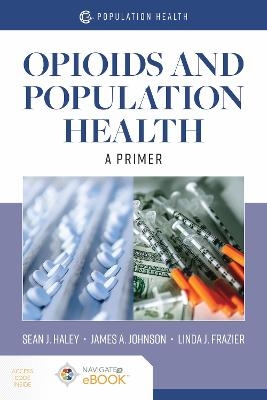
Opioids And Population Health
Jones and Bartlett Publishers, Inc (Verlag)
978-1-284-17318-5 (ISBN)
Dr. Haley is an Assistant Professor in the Department of Health Policy and Management at the City University of New York’s Graduate School of Public Health and Health Policy. Dr. Haley’s research explores implementation and policy factors that influence the prevention of substance misuse and access to treatment for substance use disorders. Before completing his doctorate at Brandeis’ Heller School of Social Policy and Management in 2007 where he was a NIAAA trainee, Dr. Haley held management and consultant positions in state government and not for profit organizations. Dr. Haley completed post his doctorate training as a Policy Research Scientist at the Treatment Research Institute in Philadelphia where he evaluated the use of performance contracting to improve treatment initiation for patients leaving medically monitored withdrawal services (formerly known as Detox units). He served as the Senior Research Analyst for the National Association of State Alcohol and Drug Abuse Directors (NASADAD) in Washington, D.C. before joining the faculty of the CUNY School of Public Health in 2010. Dr. Haley spent the 2018-2019 academic year on a Fulbright supported implementation study to improve alcohol screening and brief intervention in primary care within Rio de Janeiro’s public health care system. He serves as the Immediate Past Chair for the Alcohol, Tobacco and Other Drug Section of the American Public Health Association where he leads national efforts to reduce alcohol availability expansion efforts initiated during COVID. Most recently Dr. Haley served as theconvenor and lead facilitator of a national coalition to address racial equity and tobacco control which produced the following value statement: “Decriminalizing Commercial Tobacco: Addressing Systemic Racism in the Enforcement of Commercial Tobacco Control.” Dr. Haley completed his undergraduate degree at the University of Vermont and his MPH in policy and administration from the University of Michigan’s School of Public Health. James A. Johnson is a medical social scientist who specializes in organizational and health systems development. He is a Professor in the School of Health Sciences and Doctor of Health Administration (DHA) Program at Central Michigan University where he teaches courses in comparative health systems, organizational behavior, and health systems thinking. He'is a very'active researcher and health science writer with over 100 journal articles and'20 books published. One book read worldwide is Comparative Health Systems: Global Perspectives'where he and co-researchers analyzed the health systems of 20 different countries. He is also the co-author of the recently published Health Systems Thinking.'Eighteen of Professor Johnson’s books have been selected for the permanent collection of the National Library of Medicine.Dr. Johnson is past-editor of the American College of Healthcare Executives (ACHE) Journal of Healthcare Management and a Contributing Editor for the Journal of Health and Human Services Administration, and global health editor for the Journal of Human Security and Resilience.'Additionally, he has served on many boards including the Scientific Advisory Board of the National Diabetes Trust Foundation; American Public Health (APHA) Governing Council; Board of the Association of University Programs in Health Administration (AUPHA); Advisory Board of the Alliance for the Blind and Visually Impaired; Board President of Charleston Low Country AIDS Services; Advisory Board of the Joint Africa Working Group;'Advisory Board of the Center for Collaborative Health Leadership; and Board of Advisors for Health Systems of America. He is a regular delegate to the World Health Congress and a member of the Global Health Council. 'Dr. Johnson completed his Ph.D. at Florida State University.' Linda Frazier is Director of Addictions Initiatives at Advocates for Human Potential, Inc. Ms. Frazier is a registered nurse and master-certified health education specialist. Her clinical experience includes women’s health, adolescent and college health, inpatient and urgent care services. Her most recent clinical role was as the outpatient behavioral health nurse responsible for assessment, monitoring, and patient education for MOUD intensive outpatient clients in treatment. Before moving into full time consulting, Ms. Frazier worked in a variety of leadership roles at the Harvard University Health Services and the Maine Department of Health and Human Services (DHHS) Substance Abuse and Mental Health Services (SAMHS). As Treatment Team manager and then Associate Director for SAMHS she oversaw expansion of MOUD across Maine between 2005-2009. She'served as the Maine National Treatment Network (NTN) representative and was responsible for supervision of the state opiate treatment authority (SOTA) and OTPs across the state. Since 2009, Ms. Frazier has provided training and technical assistance in behavioral health and primary care integration, process and quality improvement, and the implementation of evidence-based practices with a focus on MOUD. Ms. Frazier has served on the leadership team of the American Public Health Association (APHA) Alcohol, Tobacco, and Other Drugs Section (ATOD) since 2009. She chaired the North American Cannabis Summit (2019), which is focused on public health research, equity, policy, and best practices in state legislation and the regulatory oversight of cannabis. Her background includes teaching introduction to public health as adjunct faculty at Husson College in Bangor Maine. Ms. Frazier received her BS in Adolescent Development and Health and her MA in Education from the University of Minnesota in Minneapolis. She is based in New England and travels frequently to Arizona, Taiwan and China where her children and partner of 35 years live and work.
| Erscheinungsdatum | 10.05.2021 |
|---|---|
| Verlagsort | Sudbury |
| Sprache | englisch |
| Themenwelt | Medizin / Pharmazie ► Medizinische Fachgebiete ► Schmerztherapie |
| Medizin / Pharmazie ► Pflege | |
| Studium ► Querschnittsbereiche ► Prävention / Gesundheitsförderung | |
| Sozialwissenschaften ► Pädagogik ► Bildungstheorie | |
| Sozialwissenschaften ► Pädagogik ► Didaktik | |
| ISBN-10 | 1-284-17318-6 / 1284173186 |
| ISBN-13 | 978-1-284-17318-5 / 9781284173185 |
| Zustand | Neuware |
| Haben Sie eine Frage zum Produkt? |
aus dem Bereich


